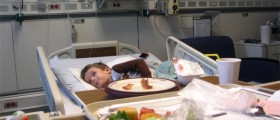
Allergy is reaction of human body to certain substances thatare normally not harmful. When there is a failure in immune system, it can’t differentiate between dangerous and non-dangerous things and it reactscausing the allergic reaction.
About 3% of the adult population experienced food allergy,but this number is almost twice higher in children. Something these people eattriggers their immune system and it reacts abnormally, starting the reactionagainst this substance. This defense mechanism can’t tell if this is thebacteria or the virus or something else, so it starts the attack and provokeallergic reaction in the body.
Food Allergy
Some of the foods known to provoke allergic reactions are:peanuts, various tree nuts, milk, eggs, soy, wheat, fish, shrimps, shellfishesand lobster. In general, any type of food may be responsible for allergies. Kidsare more likely to experience allergic reaction to milk, peanuts, egg or soy,while adults are more prone to nut and sea food allergies.
Symptoms of food allergy may include vomiting right afterthe person eats something he or she is allergic to. Other times, food allergymay manifest as the itching and hives on the skin, irritating the personprofoundly. Nausea, metallic taste, diarrhea and stomach problems are verycommon in food allergies. If you eat something you shouldn’t because of theallergy, you could also experience coughing, wheezing or throat problems.
The body may also react by swelling. This can includedifferent organs and in some cases it is known to progress further and lead tomore serious problems with digestive and respiratory system.
The most severe allergic reaction is called anaphylacticreaction and the situation might be life threatening. This problem occurssuddenly and intensively. It usually includes all the symptoms already mentionedto be associated with allergic reactions to food, but patients might not beable to breathe freely and there is a problem with extremely low blood pressureas well.
Diagnosis and Treatment of Food Allergy
Once you experienced some of the symptoms of food allergy,you should consult your doctor. There are skin and blood tests, used todetermine what exactly are you allergic to, so your doctor might need toperform some of these.
According to the diagnosis and the severity of your reactionto these foods, you may be prescribed with some medications. In other cases, drugsare not necessary, but doctors advise caution when consuming the food. Yourbest bet is to avoid the foods you are allergic to.

















Your thoughts on this
Loading...